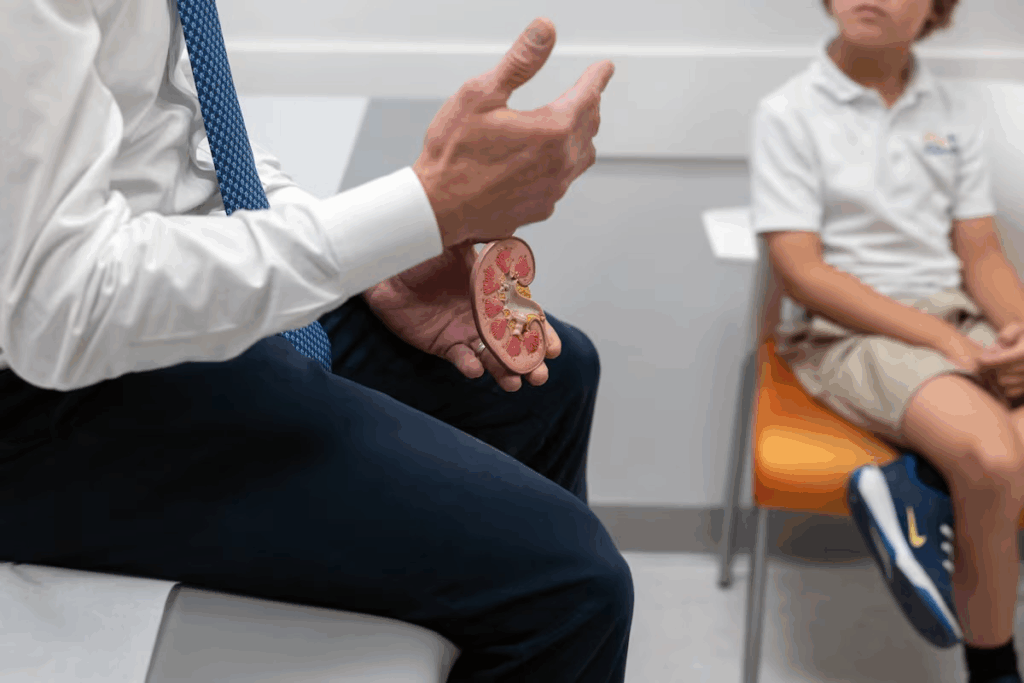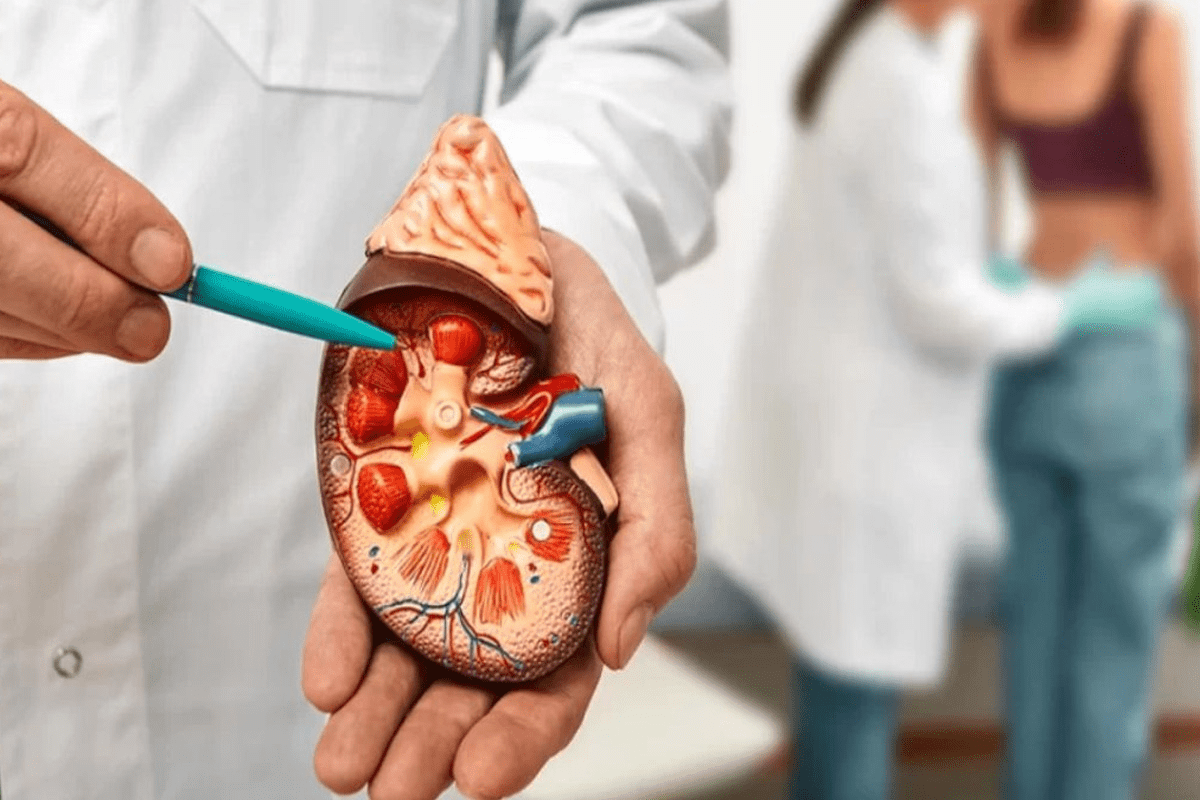
Kidney stones are hard deposits that form from chemicals in urine. They mainly cause severe back and flank pain. But, they can also lead to unexpected symptoms like chest discomfort and breathing troubles.
At Liv Hospital, we know that stone-related discomfort can feel like heart problems. This can make people worry about their heart health. It’s important to understand this connection to get the right treatment.
Key Takeaways
- Kidney stones can cause chest pain through several mechanisms.
- The radiating nature of stone-related discomfort can mimic cardiac events.
- Understanding the causes of chest pain is vital for proper diagnosis.
- Liv Hospital offers innovative solutions for patients suffering from kidney stones.
- Breathing troubles can be associated with kidney stone episodes.
Understanding Kidney Stones: Formation and Prevalence

To understand kidney stones, we need to know how they form and how common they are. Kidney stones are hard mineral collections in the kidneys. They are quite common.
What Are Kidney Stones?
Kidney stones, or renal calculi, are solid masses in the urine. They can be made of calcium oxalate, uric acid, or cystine. Dehydration, diet, and genetics play a role in their formation.
Types of Kidney Stones
There are many types of kidney stones, each with its own cause and composition.
- Calcium Stones: These are the most common, made of calcium oxalate.
- Uric Acid Stones: These form in acidic urine.
- Cystine Stones: Rare, linked to genetic disorders.
- Struvite Stones: Often caused by urinary tract infections.
Prevalence Statistics in the United States
Kidney stones are common. About one in eleven people in the U.S. will get them at some point.
Prevalence | Percentage |
Overall Prevalence | 8.8% |
Male Prevalence | 10.6% |
Female Prevalence | 7.1% |
Kidney stone pain can cause anxiety and high blood pressure. Knowing about kidney stones helps us understand risks and manage symptoms better.
Common Symptoms of Kidney Stones

Knowing the symptoms of kidney stones is key for quick treatment. These stones can cause many symptoms, affecting how well a person feels.
Primary Symptoms and Pain Patterns
The main symptom of kidney stones is intense pain. This pain starts in the back and moves to the groin. It can come and go, getting worse as the stone moves.
The pain from a kidney stone is unique. It hits suddenly in the back and spreads to the groin. This pain is so bad it often makes people feel sick to their stomach.
Secondary Symptoms
Kidney stones also have secondary symptoms. These include:
- Nausea and vomiting
- Fever and chills if an infection is present
- Blood in the urine (hematuria)
- Frequent or painful urination
- Urinary urgency
These symptoms help doctors know if a kidney stone is present and if there are complications.
Symptom Variations Based on Stone Size and Location
The size and where a stone is located change symptoms. Big stones cause more pain and blockage. Small stones might pass with less pain.
Where the stone is in the urinary tract also matters. A stone in the ureter can cause a lot of pain and block urine. Sometimes, the pain can even spread to the chest, but this is rare.
Doctors need to understand these symptom changes to treat kidney stones well.
Can Kidney Stones Cause Chest Pain?
Kidney stones usually cause pain in the lower back. But sometimes, the pain can move to the chest. This makes us wonder how this happens.
Pain radiation mechanisms are key to understanding chest pain from kidney stones. The pain from stones can travel through nerves to other parts of the body.
Pain Radiation Mechanisms
Pain from kidney stones travels through nerves to the spinal cord and brain. Sometimes, this pain is felt in the chest. This is because of how our nervous system maps pain.
Referred pain happens when our brain gets pain signals wrong. For kidney stones, this means feeling pain in the chest or other places, not just where the stone is.
Anatomical Relationship Between Kidneys and Ribcage
The kidneys are under the ribcage. This close relationship helps explain why kidney pain can feel like it’s in the chest. The pain can be felt in the upper belly or lower chest.
Research on Referred Pain Patterns
Studies show that how pain is felt can vary a lot. Research on kidney stone pain has helped us understand why some people feel chest pain.
Knowing these patterns is key to treating kidney stones right. It’s important when symptoms don’t seem typical.
Shortness of Breath and Kidney Stones
Understanding the link between kidney stones and shortness of breath is key. We need to look at how kidney stones affect the body and cause pain. Sometimes, these stones can lead to breathing problems.
Physiological Connections
The connection between kidney stones and shortness of breath is complex. Kidney stones cause severe pain, which can stress the body. This stress can increase heart rate, blood pressure, and breathing rate.
Severe pain can make breathing hard. A study found that the pain from kidney stones can cause people to breathe too much. This can lead to a condition called respiratory alkalosis.
“Severe pain can lead to anxiety and panic, further exacerbating breathing difficulties.”
Pain-Induced Breathing Difficulties
Pain from kidney stones can make breathing hard. The pain can spread to the lower back and abdomen. This makes it hard to take deep breaths.
Some people feel chest discomfort or think they’re having a heart attack. The pain from kidney stones can cause a lot of stress. This stress can make anxiety and blood pressure go up.
When Breathing Problems Signal Complications
Breathing problems can mean there’s a bigger issue with kidney stones. For example, if a stone causes an infection or blocks the urinary tract, it can lead to serious problems. These problems can affect how well you breathe.
Complication | Symptoms | Impact on Breathing |
Infection | Fever, chills, flank pain | Potential for sepsis, affecting respiratory rate |
Urinary Tract Blockage | Severe pain, nausea, vomiting | Can lead to acute kidney injury, affecting fluid balance and respiratory function |
If you’re having trouble breathing, it’s important to see a doctor. They can check for any serious problems.
Kidney Stones vs. Heart Attack: Similar Symptoms
Kidney stones and heart attacks can look similar, making diagnosis tricky. We’ll look at the shared symptoms, differences, and why they’re often mixed up. This will help doctors make better diagnoses.
Overlapping Symptoms
Kidney stones and heart attacks share symptoms like severe pain. The pain from stones can feel like it’s in the chest, abdomen, or groin. This can lead to confusion about where the pain is coming from.
Common overlapping symptoms include:
- Severe pain
- Nausea and vomiting
- Sweating
- Shortness of breath
Key Differences in Presentation
Even though symptoms can be similar, there are clear differences between kidney stones and heart attacks. Knowing these differences is key to making the right diagnosis.
Symptom | Kidney Stones | Heart Attack |
Pain Location | Typically starts in the flank, radiates to the groin | Central chest pain, radiates to arm, neck, or jaw |
Nature of Pain | Sharp, colicky | Crushing, squeezing |
Associated Symptoms | Nausea, vomiting, possibly hematuria | Sweating, shortness of breath, lightheadedness |
Why Misdiagnosis Occurs
Misdiagnosis happens because symptoms can be similar and not enough tests are done. Reasons include:
- Inadequate medical history
- Lack of specific diagnostic markers for kidney stones
- Overreliance on symptom presentation alone
Healthcare providers must think of both conditions when patients have sudden pain and related symptoms.
Complications of Kidney Stones That Affect the Chest Region
Kidney stones mainly affect the urinary tract. But, they can also cause problems in other areas, like the chest. These issues can happen because of infections, blocked urine flow, or other related problems.
Infections and Sepsis
One serious issue with kidney stones is infections. These infections can turn into sepsis, a very dangerous condition. When bacteria get into the urinary tract, they can reach the kidneys and cause pyelonephritis, a kidney infection.
- Infections happen when bacteria move from the urinary tract to the kidneys.
- Symptoms include fever, chills, and pain in the flank.
- Untreated infections can lead to sepsis, which is a medical emergency.
Hydronephrosis and Pressure Effects
Kidney stones can block the urinary tract. This leads to hydronephrosis, where the kidney swells with urine. The swelling can put pressure on the chest area.
This pressure and pain can feel like it’s coming from the upper abdomen or chest. It might seem like other serious problems.
Rare but Serious Complications
In rare cases, kidney stones can cause severe problems. For example, a bad infection can lead to septic emboli. These can go to the lungs and cause serious breathing issues.
“The presence of kidney stones can lead to a cascade of complications, some of which can have far-reaching effects on the body, including the chest region.”
It’s important for people with kidney stones to know about these possible complications. Quick medical help can stop serious problems from happening.
Psychological Effects: Anxiety and Blood Pressure Changes
Kidney stones can cause a lot of pain, leading to stress in the body. This stress can raise anxiety levels and blood pressure. The body’s “fight or flight” response is triggered by the pain from kidney stones.
Pain-Induced Anxiety and Panic Attacks
The pain from kidney stones can be very severe. It can cause a lot of anxiety and even panic attacks. This anxiety comes from the pain and the fear of what might happen next.
Some common symptoms of pain-induced anxiety include:
- Rapid heartbeat
- Sweating
- Trembling or shaking
- Shortness of breath
- Feelings of impending doom or dread
Can Kidney Stones Raise Blood Pressure?
Yes, kidney stones can increase blood pressure. This is due to the pain and the body’s stress response. The stress response can make the heart rate and blood pressure go up.
Key factors that contribute to blood pressure changes include:
- The severity of the pain experienced
- The individual’s stress response
- Pre-existing hypertension or cardiovascular conditions
Managing the Psychological Impact
It’s important to manage the psychological impact of kidney stones. This involves treating the stones and finding ways to deal with anxiety and stress.
Some effective strategies for managing anxiety related to kidney stones include:
- Cognitive-behavioral therapy (CBT) to address negative thought patterns
- Relaxation techniques such as deep breathing, meditation, or yoga
- Support groups to share experiences and coping strategies with others
By treating both the physical and psychological aspects of kidney stones, patients can manage their condition better. This improves their quality of life.
Diagnosis and Treatment When Chest Symptoms Occur
If you have kidney stones and feel chest pain, you need to see a doctor right away. Chest pain can mean many serious things. It’s important to figure out what it means to get the right treatment.
Medical Tests to Differentiate Causes
Doctors use many tests to find out why you have chest pain with kidney stones. These tests include:
- Electrocardiogram (ECG): This checks your heart to see if it’s the cause of the pain.
- Imaging tests: Like chest X-rays or CT scans, to look at your heart and lungs.
- Blood tests: To see if you have infections or heart damage.
- Urine analysis: To check for kidney stones or infections in your urine.
These tests help doctors tell if your pain is from kidney stones or something more serious like a heart attack.
Treatment Approaches
The treatment for chest pain with kidney stones depends on the cause. If it’s from the stones, doctors might use:
- Pain management: Medications to help with pain.
- Hydration: Drinking lots of water to help pass the stone.
- Medical expulsion therapy: Medications to help the stone move faster.
If the pain is from something else, like a heart problem, treatment will be different.
When to Seek Emergency Care
It’s important to know when to go to the emergency room. If you have:
- Severe chest pain or pressure
- Shortness of breath
- Dizziness or fainting
- Severe pain or trouble urinating
Going to the emergency room quickly can save your life. It’s key to managing kidney stones and their symptoms.
Conclusion
Kidney stones can cause more than just flank pain. They can also lead to chest pain and breathing issues. In this article, we’ve looked into how kidney stones, chest pain, and shortness of breath are connected.
We’ve talked about how kidney stones can cause pain that feels like it’s in the chest. This pain might be mistaken for a heart attack. We’ve also seen how kidney stones can affect breathing, leading to breathing problems.
In short, kidney stones can cause pain that feels like it’s in the chest. It’s important to understand these symptoms to get the right diagnosis and treatment. By knowing the complications of kidney stones, doctors can give better care to patients.
Our summary shows why kidney stones should be considered when someone has chest pain or trouble breathing. It’s key to have a full medical check-up to find out what’s really going on.
FAQ
Can kidney stones cause chest pain?
Yes, kidney stones can cause chest pain. This happens because pain from the lower back radiates to the chest. The way the kidneys and ribcage are connected also plays a role.
Do kidney stones cause shortness of breath?
Kidney stones can indirectly cause shortness of breath. This is because pain can make it hard to breathe. Sometimes, complications from kidney stones can also lead to breathing issues.
Can kidney stones feel like a heart attack?
Yes, kidney stones can sometimes feel like a heart attack. This is because they share symptoms like chest pain. But, the real cause is different, and a proper diagnosis is key.
Can kidney stones cause anxiety?
Yes, the pain from kidney stones can cause anxiety and panic attacks. It’s important to manage the psychological impact of kidney stones for the patient’s well-being.
Can kidney stones raise blood pressure?
Yes, kidney stones can affect blood pressure. This is due to the pain and discomfort they cause. Also, conditions that lead to kidney stones can impact blood pressure.
Do kidney stones hurt when you breathe?
The pain from kidney stones can get worse with breathing or movement. This depends on the stone’s location and size. Deep breathing can irritate the tissues around the stone, making the pain worse.
What are the common symptoms of kidney stones?
Common symptoms include severe pain in the lower back, abdomen, or groin. Other symptoms are nausea, vomiting, and needing to urinate often. The symptoms vary based on the stone’s size and location.
How are kidney stones diagnosed when chest symptoms occur?
Diagnosing kidney stones with chest symptoms involves several tests. These include imaging studies like CT scans or X-rays. These tests help find the cause of symptoms and rule out other conditions like heart disease.
What are the treatment approaches for kidney stones with chest symptoms?
Treatment for kidney stones with chest symptoms depends on the cause and the stone’s details. Options include pain management, staying hydrated, and sometimes surgery.
References
Kidney Stones and Cardiovascular Events: A Cohort Study – https://pmc.ncbi.nlm.nih.gov/articles/PMC3944758/


































